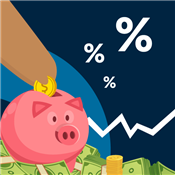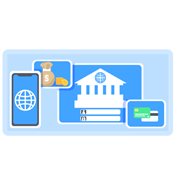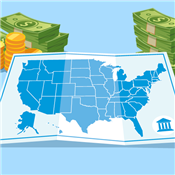Best Savings Accounts to Open Online in February 2026
Ad Disclosure: This article contains references to products from our partners. We may receive compensation if you apply or shop through links in our content. This compensation may impact how and where products appear on this site. You help support CreditDonkey by using our links.
Maximize your savings with the best online banks offering high-interest rates, security, and flexibility. Uncover your options.
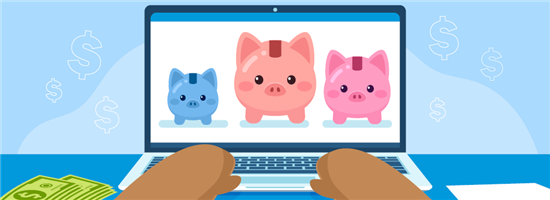 |
Are you tired of your savings barely earning any cash? It's time to switch to an online savings account. They offer much higher interest rates than traditional brick-and-mortar banks.
Make your money work for you and reach your dreams faster. Plus, you can open an account from home (no need to put on pants).
Ready to level up your savings? Here are the best online savings accounts available, including rates, monthly fees, and minimum deposits.
Where is a Good Place to Open a Savings Account?
CIT Bank Platinum Savings - 3.75% APY
- 3.75% APY with a balance of $5,000 or more
- 0.25% APY with a balance of less than $5,000
- $100 minimum opening deposit
- No monthly maintenance fee
- Member FDIC
UFB Portfolio Savings - Earn up to 3.26% APY
- Earn up to 3.26% APY.*
- No monthly maintenance fees.
- No minimum deposit required to open an account.
- Access your funds 24/7 with easy-to-use digital banking tools.
- Enjoy peace of mind with FDIC insurance up to the maximum allowance limit – Certificate #35546.
High-Yield Savings Premier - 3.80% APY
- No account fees
- Option to open individual or joint account
- FDIC insured up to $250,000 per depositor
- Only $500 minimum opening deposit
High Yield Savings Account - 3.86% APY
- $1 minimum deposit
- No fees
- 24/7 online access to funds
- FDIC insured
Axos ONE - Earn up to 4.21% APY
- Earn up to 4.21% APY* on savings, and 0.51% APY* on checking when you meet requirements.
- Get your money up to 2 days early.
- No monthly maintenance, minimum balance, account opening, or overdraft fees.
High-Yield Savings Account - 3.90% APY
- $1 minimum deposit
- No fees
- 24/7 online access to funds
- FDIC insured
Personal Savings - Earn 3.80% APY
- Earn 3.80% APY
- No minimum balance requirement
- No monthly service fee
High-Yield Savings Account - Up to $1,500 Bonus
- Select a savings offer and sign up: Choose and fund at least one high-yield savings account or CD on the Raisin platform to get started. Be sure to enter bonus code HEADSTART during sign-up to be eligible for a cash bonus.
- Deposit funds: The more you save, the more you can earn. Make a qualifying deposit(s) within 14 days of opening your account to set your bonus tier.
- Maintain your deposit(s): Maintain your deposit(s) for 90 days from your first deposit date to earn your bonus.
| Deposit | Cash Bonus |
|---|---|
| $10,000 - $24,999 | $70 |
| $25,000 - $49,999 | $175 |
| $50,000 - $99,999 | $350 |
| $100,000 - $199,999 | $750 |
| $200,000 or more | $1,500 |
Current Savings - Up to 4.00% bonus
- 4.00% bonus on up to $6,000 balance if you receive and maintain a qualifying direct deposit of $200 or more in a rolling 35 day period. (Otherwise, 0.25%)
- Simply add money to your Savings Pods and enable the Boost feature.
- Earn bonus on up to 3 Savings Pods, up to $2,000 balance each.
- Bonuses accumulate daily.
Saving money is one of the smartest financial practices to have. But did you know that there's a, shall we say, dumb way of doing it?
Interest rates on typical bank savings accounts are laughably low. The national average interest rate is just 0.39% APY (as of February 2026).[1]
Online banks provide much higher interest rates. Choose one of these accounts to get the most out of your hard-earned savings.
UFB Portfolio Money Market - Earn up to 3.26% APY
- Earn up to 3.26% APY*
- Enjoy no monthly maintenance fees with a $5,000.00 balance, otherwise fee is $10.00 per month.
- Access your funds 24/7 with easy-to-use digital banking tools.
- Have peace of mind with FDIC insurance up to the maximum allowable limit – Certificate #35546.
No, the interest rates for savings accounts are variable. The bank can change them at any time. If you're looking for fixed rates, a Certificate of Deposit (CD) will guarantee a fixed APY for the entire term.
Best Online Savings Accounts
 |
Here are some of the best savings account rates for February 2026:
- Axos ONE:
Earn up to 4.21% APY - Valley National Bank:
High-Yield Savings Account - 3.90% APY - Mission Valley Bank:
High Yield Savings Account - 3.86% APY - Western Alliance Bank:
High-Yield Savings Premier - 3.80% APY - Live Oak Bank:
Personal Savings - Earn 3.80% APY - CIT Bank Platinum Savings:
3.75% APY - Quontic:
High Yield Savings - 3.50% APY - UFB Freedom Checking & Savings:
Unlock Up to 3.46% APY
CIT Bank Savings Account: Best Overall (3.65%+ APY)
CIT Bank is a popular online bank known for high savings rates. It's an online division of First Citizens Bank, the largest family-controlled bank in the US with over a century of history.
They offer 2 great savings accounts with high APYs:
- Platinum Savings: You get 3.75% APY with a balance of $5,000 or more. So it's best if you plan to keep at least $5,000 in your savings account. You only need $100 to open. Find out more.
- Savings Connect: Earn 3.65% APY on your entire balance. This is better if you don't want to worry about maintaining a certain amount. Find out more.
Both accounts are only $100 to open and have no monthly fee.
Neither accounts don't come with an ATM card for easy withdrawals. So it's a great place to park your savings for short-term goals and grow your money.
CIT Bank Savings Connect - 3.65% APY
- APY: 3.65%
- Monthly Fee: $0
- Minimum Deposit to Open: $100
- Balance Requirement: $0
CIT Bank Platinum Savings - 3.75% APY
- APY: 3.75% APY with a balance of $5,000 or more
- Monthly Fee: $0
- Minimum Deposit to Open: $100
- Balance Requirement: $0; $5,000 to earn the highest APY
As long as the bank has FDIC insurance, then yes, online banking is safe. This means that if the bank defaults, the U.S. government will pay you back every cent you had in the account, up to the FDIC maximum of $250,000.
All the savings accounts in this list are FDIC insured.
Quontic: High Interest Rate
Quontic is a unique digital bank known for its variety of checking accounts with great rewards (including the first ever Bitcoin-back account). It also has impressive savings rates.
The High Yield Savings Account offers one of the best rates we can find. It has no monthly maintenance fees and no overdraft fees.
We also like Quontic for its community mission. Your deposits are used for good. They're used to help low-income families, people of color, and other marginalized groups secure mortgage financing.
High Yield Savings - 3.50% APY
- APY: 3.50%
- Monthly Fee: $0
- Minimum Deposit to Open: $100
- Balance Requirement: $0
Synchrony Bank: ATM Access
Synchrony Bank (which used to be part of General Electric) offers the best savings account for flexibility, competitive rate, and no minimum.
A great feature with Synchrony's online savings account is that it comes with an ATM card for easy access. So if you need your money quickly (like in an emergency), you can withdraw from an ATM instead of having to wait for a bank transfer.
Synchrony will even refund domestic ATM fees charged by other banks, up to $5 per statement cycle.[2]
High Yield Savings - 3.50% APY
- APY: 3.50%
- Monthly Fee: $0
- Minimum Deposit to Open: $0
- Balance Requirement: $0
Online banks don't have physical locations, which means they save a lot on operating costs compared to brick-and-mortar banks. They pass those savings onto customers by offering better rates and lower fees.
LendingClub: APY on all balances
LendingClub (previously Radius Bank) offers one of the higher rates currently available. The higher APY is available on all balances. There are no monthly fees and no minimum balance requirement after your initial $100 deposit to open.[3]
The savings account does come with a free ATM card. LendingClub offers free access to over 325,000 ATMs in the MoneyPass, SUM, and NYCE ATM networks.
Your account is integrated with helpful tools, like budgeting and debt payoff plan. You can also link external accounts to see all your finances in one place.
High-Yield Savings - 4.00% APY
- APY: 4.00%
- Monthly Fee: $0
- Minimum Deposit to Open: $0
- Balance Requirement: $0
Varo: High APY for Smaller Balances
Varo is a popular digital bank with free checking, savings, and credit building.
The savings account already has a decent APY. But you can qualify to earn a way higher APY if you: receive at least $1,000 in total direct deposits each month AND don't go over a daily savings balance of $5,000.[4]
This is a great option if you usually keep a smaller balance in savings.
Varo has no credit check, so it's popular as a second chance account for those with some marks on their banking history.[5]
Online Savings Account
- APY: 2.50% APY on entire balance, with chance to earn 5.00% APY (on up to $5,000) when you meet requirements
- Monthly Fee: $0
- Minimum Deposit to Open: $0
- Balance Requirement: $0
Popular Direct: High APY on All Balances
Popular Direct Savings account is through Popular Bank, the U.S. banking subsidiary of Popular, Inc. It has one of the current best rates.
Although it requires a $100 minimum opening deposit,[6] there is no more balance requirement or monthly fees once the account is open.[7]You'll get the same APY on all account balances. But if you close the account within 180 days, there's an early closing cost of $25.[8]
Popular Direct Savings Account - 3.90% APY
- 3.90% APY
- $100 Minimum Opening Deposit
- FDIC Insured
Ally Bank: Best Customer Service
Founded in 1919, Ally Bank was previously General Motors Acceptance Corp. (GMAC), so it's got a pretty solid history.
There is no minimum required to open an account (but you have to fund it within the first 30 days). Its rates are not the highest, but many people love Ally Bank for its incredibly user-friendly site and great 24/7 customer support with real humans.
Plus, Ally is a full-service online bank with checking, savings, loans, and investing. It's a solid choice if you want a lot of financial services under one roof.
Online Savings Account - 3.30% APY
- APY: 3.30%
- Monthly Fee: $0
- Minimum Deposit to Open: $0
- Balance Requirement: $0
Alliant Credit Union: Best Credit Union
Alliant is a highly awarded online credit union known for online savings accounts.
The Alliant High-Rate Savings account offers a competitive APY if you maintain an average daily balance of $100 or more.
It comes with ATM access for easy withdrawals. You can also open up to 19 supplemental savings accounts for different financial goals.
There is $5 minimum to open, but Alliant will give it back to you. There are no monthly fees when you elect eStatements.
High-Rate Savings
- APY: 3.01%
- Monthly Fee: $0 when you opt in to eStatements
- Minimum Deposit to Open: $5
- Balance Requirement: $100 average daily balance to earn APY
Salem Five Direct: For Young Adults to Open
If you have $10 to start with, you can get a higher APY at Salem Five Direct (for balances up to $1,000,000).
There is no minimum balance and no monthly fees.
Although you might not have heard of this financial institution, it's actually got a long banking history of over 160 years. It's the online branch of Salem Five Cents Savings Bank based in Massachusetts.
That's why we love helpful guides like these. They help you discover great options that you might not be aware of.
eOne Savings Account
- 3.61% APY
- $10 Minimum Opening Deposit
- No Minimum Balance Requirement
- No Fees to Open or Maintain Account
- FDIC Insured
TIAA Bank: Best High Yield Money Market
This isn't technically a savings account, but rather a money market account. But for this article, both pretty much serve the same purpose. You can also initiate up to 6 withdrawals/transfers per statement cycle.
TIAA Bank gives you a high APY for all account balances. TIAA Bank promises that the yield of your account will stay in the top 5% of similar accounts offered in the U.S. banking market.[12]
You also get ATM access, so you have easier access to your money. TIAA Bank never charges an ATM fee. And if you have over $5,000 in the account, TIAA Bank will even reimburse 100% of the ATM fees charged by other U.S. banks.
Wealthfront: Best Non-Bank Savings Account
Wealthfront is not a bank. It's a robo-advisor that also offers a high-yield savings account for short-term goals. It only takes $1 minimum to open, and there are no management fees. You don't need to use their robo-advisor services to open this account.
There are some benefits to using a non-bank savings account. You get unlimited free transfers in and out of your account (instead of the 6/month limit for bank savings accounts). And Wealthfront provides you up to $5 million of FDIC insurance through their partner banks.[13]
Wealthfront also provides excellent free personal finance tools. It has great calculators for retirement, buying a home, college savings, and travel.
What is an Online Savings Account?
An online savings account is a savings account that's usually offered by banks with no brick-and-mortar locations. This cuts down the overhead, so they can offer much higher interest rates than traditional savings accounts.
Plus, a lot of online savings accounts don't have any monthly fees or balance requirements.
Typically, you manage your online savings account completely online through the website or mobile app. While it's convenient, it can also be a bit of a hassle if you need to deposit or withdraw cash.
No, applying for a savings account won't affect your credit. Usually, banks will only conduct a soft pull on your credit when qualifying you for a savings account.
Why Open a Savings Account
The purpose of a savings account is to safely store money that you may need to use in the near future. This could be for emergency savings, down payment for a house, for a big vacation, or for family planning.
A high-yield savings account will allow your money to grow a bit, instead of just sitting there doing nothing.
The reason you want to save in a separate account is so you don't accidentally spend it. And we all know how easy that is to do. Something's always coming up. But if you have money in a separate savings account, you're less likely to use it in a pinch.
Because you may need to use this money at any time, you don't want to take risks with it. Unlike investing, a savings account is a risk-free way to grow your money. Investing might offer higher returns, but it can be very volatile in the short term.
A high-yield savings account is for keeping your money safe and growing it a little. But remember, you're not going to get rich off of it. And don't forget, it's not a checking account, so don't use it for your everyday spending.
What to Look for in a Savings Account
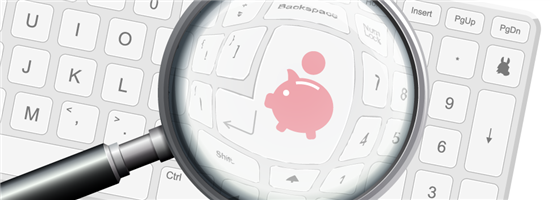 |
There are a few things you want to have in an online savings account:
- Security
You may wonder if it's safe to store your money with a non-traditional bank. No worries - the banks on this list are all under FDIC insurance, which means that if the bank defaults, the government will pay you back everything you had in the account (up to $250,000). - Flexibility
Of course, you want to be able to remove your money at any time when you need to use it, without penalty. Easy access to your funds is important. All of the above accounts allow you to transfer funds to your existing checking account at any time.Note that federal regulation limits how many times you can take your money out. You can make only 6 ACH withdrawals/transfers from a savings account per statement cycle. Also, note that it may take a few days for electronic transfers to complete. - Yield rate
Of course, you want the highest APY you can get. A high interest rate will grow your money faster, especially if you have a lot to save. - Minimum balance
Some high-yield savings accounts require a minimum balance. If you don't keep that balance, the bank may charge monthly maintenance fees or reduce interest rates.We have options with no account minimums. But some banks may give you a higher APY with a larger balance.
But if these are important activities for you, do some further research to see which accounts below have those features.
Is an Online Saving Account Right for You?
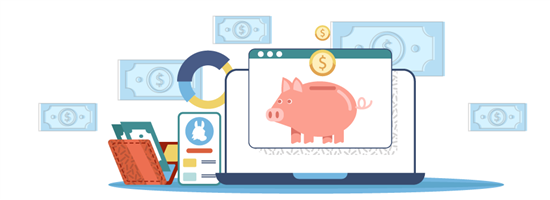 |
| © CreditDonkey |
Before you stash your money into one of the above savings accounts, here are some things to consider:
Do you need quick access to your money?
Remember, a savings account's purpose is to SAVE money, not spend it. So, an online savings account won't give you fast and unlimited access to your money. Making deposits and withdrawals could be a little tougher.
If you want to withdraw (like transferring funds out to your bank account), it typically takes 3 days or more before the transfer goes through. And you typically can only make 6 withdrawals a month.
Are you comfortable with web banking?
Completely web-based banking means that there are no physical branches. You can't just stroll into a bank and ask questions, deposit cash, withdraw money, etc.
You also lose having a relationship with your local bank. Online banks typically do have customer support by phone (or web chat), but phone calls to banks can be quite frustrating.
What is your financial situation?
Think about your goals and your financial situation. If you don't have a lot of spare cash at the end of every month, it may not be worth it to open another bank account just to store a small amount of money.
Some online savings accounts may have a minimum deposit, minimum balance, and limits on withdrawals. Make sure you can meet those requirements.
What Experts Say
CreditDonkey assembled a panel of industry experts to answer readers' most pressing questions. Here's what they said:
Savings Account vs. Money Markets vs. CDs
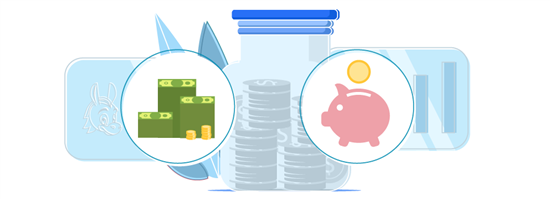 |
| © CreditDonkey |
What's the difference between the various types of savings accounts? It can be confusing. Let's go over them so you can decide which is best for your needs.
- Regular savings accounts are best for short-term savings and emergencies. You typically get just 6 withdrawals a month. They're usually used just for saving money, so you won't get a debit card.
- Money market accounts are kind of like hybrid checking and savings accounts. It's good if you need more flexibility. They still have a withdrawal limit of 6 per month, but they may offer a debit card, ATM access, and check-writing.
But in exchange for the flexibility, the interest rate may be lower. And there may be higher balance requirements. Check out the best money market rates.
- Certificates of Deposit (CDs) require you to put in a fixed amount of money for a fixed term (such as a 1-year CD, 3-year CD, etc.). You get a fixed interest rate for the entire term.
In exchange for this big commitment, a CD typically pays higher APYs. There's a penalty if you withdraw early, so they're best for long-term savings. It's good if you're afraid interest rates may go down, so you lock it in for a term.
See our guide of the best CD rates.
| Basic Savings | Money Market | Certificate of Deposit | |
|---|---|---|---|
| Monthly fees | Varies by bank | Varies by bank | None |
| Minimum balance | Varies by bank | Varies by bank | May require higher balance |
| Interest rate | Interest rate can change anytime | Interest rate can change anytime | Interest rate is locked in for entire term; usually offers higher APY for longer terms |
| Withdrawal | Limited to 6 withdrawals per month | Limited to 6 withdrawals per month; may also offer check writing, bill pay, and debit card | Cannot withdraw funds before end of term, or you'll incur a penalty |
| Deposits | Can make unlimited deposits | Can make unlimited deposits | Usually cannot add more funds once account has been opened |
| FDIC insured | Yes | Yes | Yes |
Savings Account vs. Checking Account
Checking accounts are ideal for your day-to-day money management. If you need quick and frequent access to your money, this is where you'll want to keep them.
You have the flexibility to access your funds anytime you need with no restrictions. You can also pay bills, write checks, and make debit card purchases.
See the best free checking accounts. Some may even pay interest or offer other rewards.
If you're considering a new personal checking or savings account, check out these promotions.
Other Popular Savings Accounts to Consider
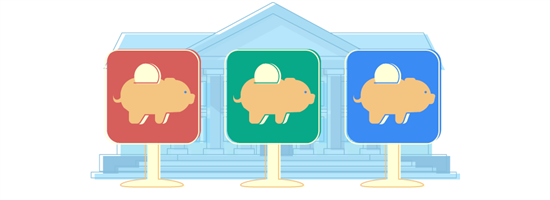 |
| © CreditDonkey |
- CIT Bank Platinum Savings:
3.75% APY - UFB Portfolio Savings:
Earn up to 3.26% APY - Western Alliance Bank:
High-Yield Savings Premier - 3.80% APY - Mission Valley Bank:
High Yield Savings Account - 3.86% APY - Axos ONE:
Earn up to 4.21% APY - Quontic:
High Yield Savings - 3.50% APY - Valley National Bank:
High-Yield Savings Account - 3.90% APY - Live Oak Bank:
Personal Savings - Earn 3.80% APY - Raisin:
High-Yield Savings Account - Up to $1,500 Bonus - Current Savings:
Up to 4.00% bonus
UFB Freedom Checking & Savings - Unlock Up to 3.46% APY
Combine Freedom Checking with Portfolio Savings to boost your savings APY by up to 0.20%.* Fewer fees, faster transactions. Plus, earn 2.00% APY* on your checking account.
High Yield Savings - Up to 0.61% APY
- 0.61% APY on balance < $25,000
- 0.25% APY on balance $25K-$100K
- 0.15% APY on balance > $100K
- No monthly maintenance fees
- No minimum balance requirements
- $250 minimum opening deposit
- Free incoming wires
- Zero minimum balance requirement
Empower Personal Cash
- 3.00% APY
- $0 monthly fee
- Withdraw up to $100k per day
Common Questions
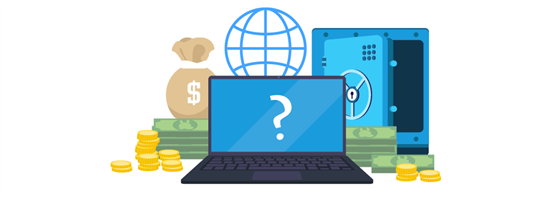 |
What is an APY?
APY stands for Annual Percentage Yield, which is the return you get over a 1-year period based on the interest rate and compounded interest. This is also based on the assumption that the funds will remain in the account for 1 year.
The simple answer is that, basically, 1.00% APY means 1% interest. This means if you save $100, you will earn $1 in interest in a year.
Can I take my money out whenever I need to?
For savings accounts, federal regulation only allows you to make 6 withdrawals/transfers per statement cycle. Excess transactions could incur a fee.
Why should I open an online savings account over investing in stocks?
A savings account gives you access to emergency funds in case something happens. It's good to have at least 3 months to 6 months of necessary expenses saved in an online savings account before you invest in stocks.
What is minimum balance requirements?
Some banks require a minimum balance to keep your account open or to receive interest. If you fall under the minimum balance, some banks may charge you a monthly service fee.
Bottom Line
It is time to start making your money work for you.
A high-interest savings account is a great way to make your money go further. Not putting your savings into one is literally like leaving money on the table. Avoid traditional national banks. There are tons of great online savings accounts that pay over 20x more in interest. Compare the difference.
CIT Bank Platinum Savings - 3.75% APY
- 3.75% APY with a balance of $5,000 or more
- 0.25% APY with a balance of less than $5,000
- $100 minimum opening deposit
- No monthly maintenance fee
- Member FDIC
UFB Portfolio Savings - Earn up to 3.26% APY
- Earn up to 3.26% APY.*
- No monthly maintenance fees.
- No minimum deposit required to open an account.
- Access your funds 24/7 with easy-to-use digital banking tools.
- Enjoy peace of mind with FDIC insurance up to the maximum allowance limit – Certificate #35546.
High-Yield Savings Premier - 3.80% APY
- No account fees
- Option to open individual or joint account
- FDIC insured up to $250,000 per depositor
- Only $500 minimum opening deposit
References
- ^ FDIC. National Rates and Rate Caps.
- ^ Synchrony Bank. FAQ: Which ATMs can I use and are there any fees?, Retrieved 8/30/2022
- ^ LendingClub Bank. High-Yield Savings FAQS: Are there any fees for a High-yield Savings account?, Retrieved 8/30/2022
- ^ Varo, How do I Earn the Higher Interest Rate or Annual Percentage Yield (APY) on my Varo Savings Account? Retrieved 3/25/2022
- ^ Varo Bank. Do you check my credit history when I apply for a Varo Bank Account?, Retrieved 8/30/2022
- ^ Popular Direct. What is the minimum deposit for a new Popular Direct savings account?, Retrieved 5/20/2023
- ^ Popular Direct. What is the minimum balance for my Popular Direct savings account?, Retrieved 5/20/2023
- ^ Popular Direct. Product Guide for the "Popular Direct Savings" Account, Retrieved 5/20/2023
- ^ Alliant. Who is eligible to join Alliant?, Retrieved 3/3/2022
- ^ NCUA. How Your Accounts Are Federally Insured, Retrieved 4/26/2023
- ^ Salem Five Direct. Consumer Banking Fee Schedule, Retrieved 5/20/2023
- ^ TIAA Bank. Yield Pledge Promise, Retrieved 8/30/2022
- ^ Wealthfront. How are my funds protected at Wealthfront?, Retrieved 5/20/2023
Write to Anna G at feedback@creditdonkey.com. Follow us on Twitter and Facebook for our latest posts.
Note: This website is made possible through financial relationships with some of the products and services mentioned on this site. We may receive compensation if you shop through links in our content. You do not have to use our links, but you help support CreditDonkey if you do.
|
|
|













